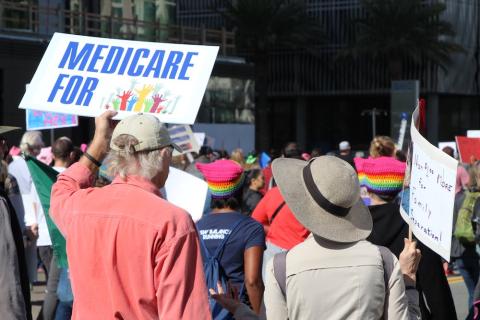With the second annual Women's March taking place this past weekend, feminists nationwide came forward to resist the Trump administration's actions against women.
However, one obvious change that would impact many women's lives for the better was often ignored: the move to a single-payer health care system.
How Single-Payer Can Help Battered and Disadvantaged Women
Imagine having a chronic or life-threatening illness. Now imagine that your health insurance coverage is dependent upon you staying with your abusive spouse. Do you leave to protect your safety and sanity? Or do you stay because any delay or change in your treatment protocol could have equally life-threatening effects?
Millions of American women face this decision every single year under our current capitalist health care system. Sadly, this is only going to get worse if a single-payer plan is not passed, as the repeal of the individual mandate under the recently passed Tax Cuts and Jobs Act will once again put the price of private insurance out of reach for those with chronic and/or life-threatening diseases.
Many abused women already choose to stay with their abusers due to financial reasons. Having access to adequate health care should not be a compelling reason to stay, and it isn't in any other industrialized nation on earth.
Only in the United States must an abused spouse need to consider whether they can afford to replace their health coverage as a factor in whether or not to flee a relationship.
This is patently absurd in the wealthiest nation on earth.
While passing a single-payer health care bill won't solve every financial problem for women seeking to leave their abusers, at least they will no longer need to consider whether leaving to escape abuse will mean the end of medical treatment for cancer, Lupus, or any one of a host of other diseases.
Single-Payer and the Fight for Female Bodily Autonomy
The Trump administration has made it no secret that its health policies toward women are punitive and unfair to the extreme.
From the repeal of the ACA mandate that employers must cover birth control at no cost to the appointment of anti-choice judges to the federal circuits as well as the Supreme Court, the current administration has already proven that it will stop at nothing short of a full-scale attack on women's health.
A single-payer system would mean equality for women in regards to their health care choices. Indeed, should Representative Barbara Lee's bill — The United States Universal Health Service Act — pass, women's reproductive health care would be fully covered, including coverage for abortion when necessary.
Given the current administration's insistence on allowing employers to refuse to cover even birth control due to “religious freedom,” a single-payer system would be an absolute boon for women.
Not only would women be covered regardless of marital status, they would be freed from having their health coverage tied to their employer's religious beliefs as well.
This, in turn, would translate into greater economic independence for women. Under our current system, many women are forced to remain in employment situations that are detrimental to their overall economic advancement simply to maintain health coverage.
Women in the workplace would have more leverage to bargain for an increased salary or greater work flexibility instead of being shackled to their current employer to keep health coverage for themselves and their families.
Single-Payer Means Healthier Families
It's an embarrassing and devastating statistic: the United States currently ranks dead last among all of the industrialized nations on earth in terms of infant mortality. More women die giving birth in the United States than in any other developed country, and the outcomes for their newborn infants isn't usually much better.
Why does the United States do so poorly in terms of maternal mortality? The answer, in large part, is linked to unequal access to reproductive health care.
In many areas of the country, such as Texas, access to reproductive health care is severely limited due to lack of funding. While so-called crisis pregnancy centers exist nearly everywhere, the amount of help they actually provide to pregnant women is negligible.
Additionally, the information given on statistics such as abortion at such centers is inaccurate and misleading.
To further complicate matters, in many areas the only hospitals available for emergency treatment of pregnancy complications are religiously run. Many such religious hospitals refuse women an abortion whether or not the health or even life of the mother is at risk, even if the pregnancy is non-viable.
A single-payer system would prohibit hospitals from denying the highest level of care to their patients in the name of their religious beliefs. Not only would this translate into lower mortality for women, it would translate into better care overall.
A single-payer system would benefit everyone: no longer would our right to health care be determined by our employment status, our marital status or other people's religious beliefs.
Due to the disparate way these factors impact women, women would benefit most of all from changing to a single-payer system. As such, feminists everywhere should check out the movement toward single-payer.
Photo Credit: Shawn M. Griffiths / IVN.us
